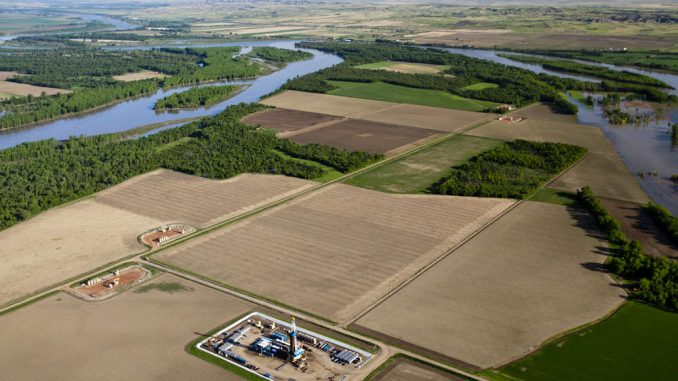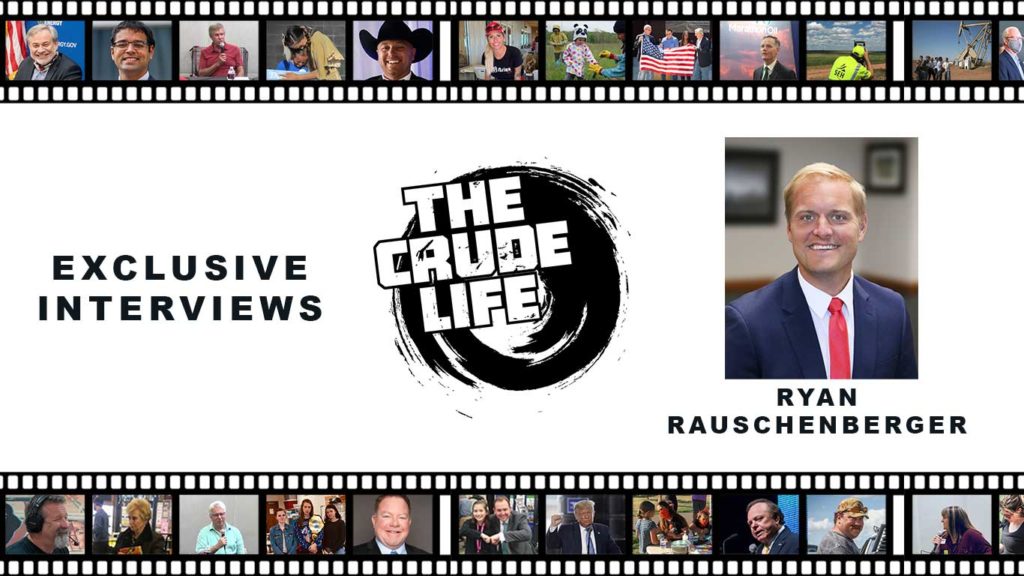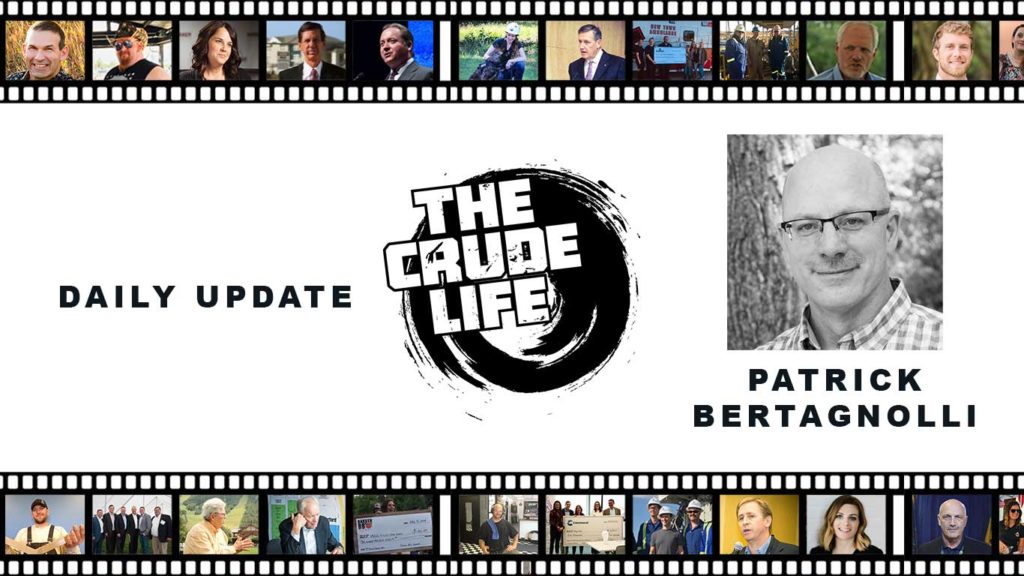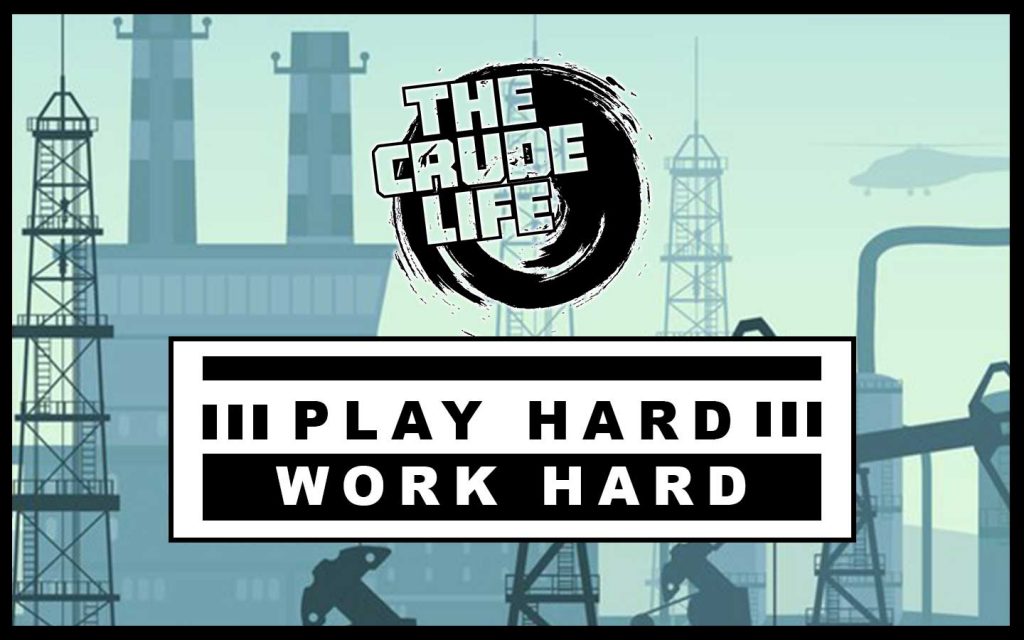
The Crude Life Morning Show: Play Hard Work Hard Episode 99
Hour One Play Hard: Jason Spiess and Sterling are feeling the Teen Version of School’s Almost Out Procrastination, ExxonMobil’s Shareholder, Denmark’s Global Court Case, K9 Inspections, Leadership Styles, Saudi Censorship Stories and Can You Taste The Carbon Credits
Hour Two Work Hard: The Crude Life Content Correspondent Genneca Houser interviews Ryan Rauschenberger
The Crude Life Daily Update For the Radio On The Podcast: Patrick Bertagnolli, SHRM-SCP, Rough Rider Center & Community Enhancement Director at City of Watford City
Rig Count Overview
source: tradingeconomics.com

HOUR ONE PLAY HARD: Jason Spiess and Sterling are both finding out that School Almost Out For Summer! Both households are in procrastination mode because if the kids are done with their work by the end of the week – school’s out.
It’s email day on The Crude Life! Jason reads a few emails that are in the News Studio Inbox including one from another K9 Pipeline inspector, giving The Crude Life an awareness of three now. The two pontificate if The Crude Life will become the “go-to” network for the canine trade arts.
Worried in Williston asks about the timeline on the Williston Basin Petroleum Conference interviews, Confused in Colorado is wondering about Stering’s Saudi Arabia upbringing.
Sterling shares a couple “censorship” stories about growing up in Dhahran, an oil and gas compound which is large enough to be a city. The two discuss how the guy who confiscated the booze and Playboys was probably the most popular guy in government and the most sought after job.
There are many changes due to Big Data, to where global CEOs and Chairman used the word “paradigm shift” last decade. Jason cites several examples in oil and gas including in Human Resources where background checks with Big Data revolutionized the hiring process making communities safer, healthier and empowered.
The two relate this to Sterling’s education in Saudi Arabia where his teacher later in life turned out to be one of the world’s most notorious sex offenders. Jason volleys back with a lesser example of how there was a sex offender on his paper route when he was 10 who invited him in for soda when he would collect.
Jason and Sterling continue to Play Hard while running down the Shale Energy Conference and Trade Show. Jason is humbles, honored and excited to be interviewing Krista
They also imagine a WWE style tag team with Mr. Kirkhammer and The Gorilla Jack accompanied by the opening band called The Electric Frac managed by Ron Gusek.
In the News, Rumors and Newsspeak portion of the show, local channel 8 has some awesome insight over the ExxonMobil shareholder making waves, Denmark’s court ruling may impact the globe and how Bill Gates’ land purchases have many people questioning why.
The Gates’ conversation dives deep into the water all the way to wondering if all his Wisconsin purchases are not for future “water rights” and “aquifer” rights since the state is surrounded by the Great Lakes.


In HOUR TWO we WORK HARD with our Newsmaker Interview: The Crude Life Content Correspondent Genneca Houser interviews Ryan Rauschenberger
North Dakota Knows How To Get Things Done
The Crude Life had the opportunity to speak with North Dakota Tax Commissioner Ryan Rauschenberger for a few minutes a day after his very popular keynote presentation at the Williston Basin Petroleum Conference. Although he attributed the popularity of the other speakers, Tax Commission Rauschenberger had some interesting content of his own to share. For example, , North Dakota has a smaller population and area in a comparison to Texas yet they’re at #2 for production in the United States, showing that North Dakota oil and gas is keeping up with the “big dogs.” Because production is so good, North Dakota is able to rely on the oil and gas industry for much of their state expenses and funding.
“Really, oil is a significant portion of not just the oil tax that’s paid, but also our sales tax base, our income tax base is very heavily reliant on oil but also farm commodities. So, we’re very much a commodity driven state.”
Tax Commissioner Rauschenberger explained how the budgeting requires the foresight to try and predict two and a half years into the future. There’s a lot of moving pieces, and it’s not an exact science which means having so much reliant upon the money from oil may complicate things.
“The industry is extremely important. Not just from the tax revenue that it generates, from the production tax, but our income and sales tax base and the income tax that’s paid from royalties. It’s really intertwined throughout our entire tax collection system.”
With so much depending on the money from oil, how are the new policies affecting the region? Tax Commissioner Rauschenberger talked about the effects of the moratorium on drilling on federal land and the potential impact of other regulations handed down from the current administration. He says that because of the current volatility, North Dakota made sure to save money for a backup fund, “just in case.” It’s called the Legacy Fund, and there’s nearly 8 and a half billion dollars saved so far, to be a cushion for the state if oil takes a turn for the worst.
“…But we’re extra cautious right now because of the potential for the federal government to expand its rulings or legislation that would hurt the industry.”
But crunching numbers for a budget is not all Tax Commissioner Rauschenberger attends to; his office goes beyond just formulating a budget and appropriating the money. He calls it a partnership, stating that he believes “what’s good for the industry is good for the state.” Because of that, Tax Commissioner Rauschenberger takes it upon himself to talk about the oil industry when possible in order to educate people on how much it props up the state, so that the public may understand just how much that money pays for. Understanding also allows for planning, which North Dakota was able to do well enough that there are still funds in savings. Smart financial planning has allowed for a decent cushion in case the industry has shortfalls, and Tax Commissioner Rauschenberger gives credit for that to the legislators and the people.
“The financial planning – you know, we play a role in that. But really, the legislature has put in place all of these different savings accounts, and frankly, the people did. The Legacy Fund was put in place by a vote of the people, and, you know, that’s a long term savings right there.”
So where does the focus go from here? Tax Commissioner Rauschenberger says right now there’s a lot of focus on flare mitigation. There’s already been legislation passed, and it provides an incentive to find different solutions to the issues surrounding flaring. There’s also been legislation passed regarding wells that sit on the boundaries of tribal reservations. This new agreement will be sending the tribe additional oil tax money.
Tribal relations have gotten better to some extent since the DAPL protests 5 years ago, and the issue of the pipeline is still very much in focus. In fact, Tax Commissioner Rauschenberger says that there is actually tribal support for the pipeline. The MHA Nation is heavily reliant on the Dakota Access Pipeline for exporting nearly 60% of the oil from their reservation. So, they are waiting with anticipation alongside North Dakota to find out the results of the environmental study, and praying that it will remain open in the meantime.
“So, we are locked in step with MHA Nation in support of the DAPL Pipeline.”
Tax Commissioner Rauschenberger then discusses how the DAPL developments have been heavily talked about in North Dakota, but the national conversation was much quieter. He said the Keystone Pipeline sort of “took the air out of the room” and left this big conversation without wind. The issue is still important, though, and the rest of the nation needs the discussion as well because it affects more than North Dakota.Tax Commissioner Rauschenberger says it affects the Nation’s energy independence and security.
“The ability for us to be able to get our crude safely and inexpensively to market is very important. You know, we take for granted, and I think not just here in North Dakota but nationally, how important it is to be energy independent and sustainable… [It] really helps keep the United States safe because we aren’t dependent on foreign oil anymore.”
With his final thoughts, Tax Commissioner Rauschenberger talked about the importance of educating people about North Dakota contributions to oil and gas. From what he says, North Dakota is a global player by itself with the state putting out more oil than some OPEC nations! So, North Dakota oil is being acknowledged on the world stage already, now we just need to spread the word at home.
“I think that’s really important to note that we’re a significant force when it comes to energy, not just in the United States, but around the world.”

The Williston Basin Petroleum Conference is put on by The North Dakota Petroleum Council
The North Dakota Petroleum Council
The North
Dakota Petroleum Council’s (NDPC) purpose is to provide governmental
relations support to the more than 525 companies it represents who are
involved in all aspects of the oil and gas industry including oil and
gas production, refining, pipeline, mineral leasing, consulting, legal
work, and oil field service activities in North Dakota, South Dakota,
and the Rocky Mountain region. The NDPC is also supported by members of
the American Petroleum Institute (API) who have interests in North
Dakota and South Dakota.
The NDPC has been the primary voice of the oil and gas industry in North Dakota since 1952. The association has a long history of legislative and regulatory success in North Dakota, which has led to a favorable business climate for the oil and gas industry in the Williston Basin. Through the years, NDPC has evolved from a division of the American Petroleum Institute with support from the Rocky Mountain Oil and Gas Association (RMOGA) and eventually the North Dakota Oil and Gas Association (NDOGA), to the present structure as a standalone association.
NDPC Mission
The North Dakota Petroleum
Council’s mission is to promote and enhance the discovery, development,
production, transportation, refining, conservation, and marketing of
oil and gas in North Dakota, South Dakota, and the Rocky Mountain
region; to promote opportunities for open discussion, lawful
interchange of information, and education concerning the petroleum
industry; to monitor and influence legislative and regulatory
activities on the state and national level; and to accumulate and
disseminate information concerning the petroleum industry to foster the
best interests of the public and industry.

The Crude Life Daily Update For the Radio On The Podcast: Patrick Bertagnolli, SHRM-SCP, Rough Rider Center & Community Enhancement Director at City of Watford City.
Bertagnoli talks about the student ambassador program and gives a couple student examples of how industrial exposure and community opportunity has now turned into careers.
Click here for full length interview

For sponsorship information on The Crude Life Morning Show Play Hard Work Hard, email studio@thecrudelife.com or click here.
Sponsors, Music and Other Show Notes

Studio Sponsor: The Industrial Forest
The Industrial Forest is a network of environmentally minded and socially conscious businesses that are using industrial innovations to build a network of sustainable forests across the United States.

Weekly Sponsor: Korwell Energy
Korwell Energy is an industry leading designer, ASME code manufacturer, and remanufacturer of production equipment for oil and gas producers, throughout the Rocky Mountain Region.
They retain both an ASME U and R stamp. Their 28,000 sq ft of manufacturing shop with overhead cranes create a safe and productive environment for their team who collectively have over 75+ years of experience in manufacturing of ASME Oil and Gas production equipment.
Korwell prides themselves on outstanding customer service, expertise, and cutting-edge technology to partner with customers to maximize their individual production goals and help comply with ever changing regulations.

Weekly Sponsor: MineralTracker
MineralTracker is the only mineral management software that allows mineral owners to compare actual royalty payments to expected payments based on well performance and a proprietary, Bakken-specific reservoir model built by MineralTracker’s petroleum engineers.
MineralTracker was formed in Watford City, North Dakota, and is a subsidiary of First International Bank & Trust, a family-owned bank also based in Watford City.

Phone Line Sponsor: Swan Energy, Inc. 866.539.0860

Studio Email and Inbox Sponsor: To Be Announced

Featured Music: Moody River Band
For guest, band or show topic requests, email studio@thecrudelife.com
Spread the word. Support the industry. Share the energy.
If you have a chance, check out The Crude Life Podcast!

